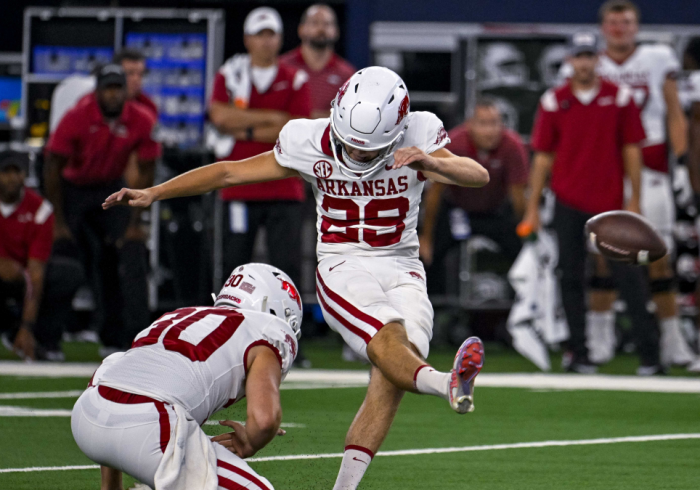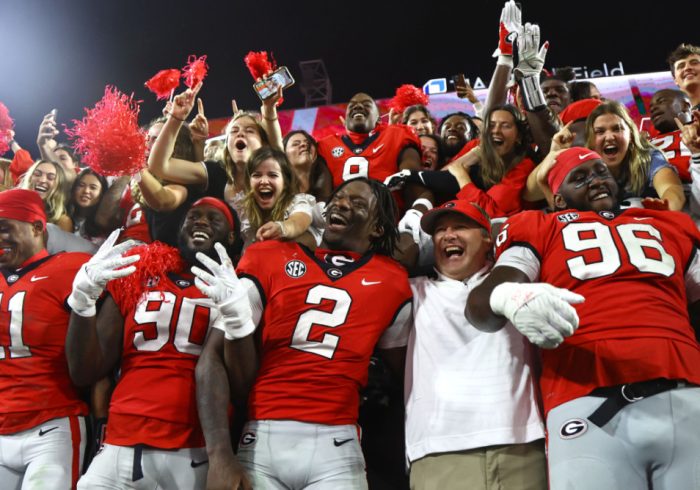SAN ANTONIO – Dressed in a freshly pressed gray suit and black shoes, Jim Phillips coasted through the Grand Hyatt lobby at the NCAA convention on Thursday, his black work bag draped over his shoulder and a smile on his face.
He darted among athletic administrators, commissioner colleagues and others, stopping to chat with some and pose for photos with others.
“That should be the next Big Ten commissioner,” said one athletic director, gesturing toward the ACC commissioner. “They should have hired him three years ago.”
Kevin Warren’s departure from the Big Ten—a long-expected exit to return to professional sports—sent a buzz through the NCAA convention, one of the largest gatherings of college athletic executives each year. Warren, having just completed his third year as Big Ten commissioner, accepted the job as the Chicago Bears’ CEO and president and is expected to start there later this spring.
The news signaled another change among the group of College Football Playoff commissioners, the most powerful room in college athletics that’s undergone dramatic turnover in the last several years. The opening at the Big Ten is the most significant since Warren’s predecessor, Jim Delaney, left the office in 2019.
Along with the SEC commissioner job, the position is arguably the most important within the rapidly changing industry of college athletics. The news triggered a question from dozens here in downtown San Antonio: Who’s next up?
“It’s one of these most powerful brands in college sports,” says Craig Thompson, the former Mountain West commissioner. “They’re facing CFP expansion, additional membership, a new TV contract. There’s some very heavy lifting to be done.
“Somewhat similar to the NCAA president who was just named, they need to hire someone that listens and communicates.”
For many around college sports, the natural choice is Phillips, the longtime former Northwestern athletic director and Chicago native who many believe finished runner-up to Warren in the search to replace Delaney. In a brief moment with a reporter Thursday, Phillips politely declined comment on the situation.
The hiring decision is in the hands of the Big Ten presidents, a group that has drastically changed since the search for Delaney. There are new leaders at Big Ten powerhouses Ohio State and Michigan. The man who chaired the presidents group during the 2019 search, Northwestern’s Morton Schapiro, retired in August.
Will a new board extend an invitation to the 2019 runner-up? Would Phillips leave the ACC after just two years at the helm?
“No one would blame him,” says one ACC administrator.
From a league financial perspective, the Big Ten and ACC are in quite different situations. The Big Ten recently expanded to include USC and UCLA and signed a TV deal that is expected to be worth more than $1 billion a year. The ACC is locked into a television deal with ESPN for another 14 years that pays out a fraction of that amount.
By the end of the Big Ten’s TV contract—which is back-loaded—its schools are set to receive annual distribution amounts of at least $80 million. ACC schools are stuck in a deal that distributes roughly half that.
“Kevin [Warren] took over a Ferrari,” says one athletic official. “Jim Phillips took over a Ford.”
Phillips is far from the only natural candidate for the gig. Ohio State’s Gene Smith is another. Or maybe the job will go to an outsider. Three of the last four commissioner hires have come from outside of college athletics: Warren, George Kliavkoff (Pac-12) and Brett Yormark (Big 12).
Some believe the Big Ten should find another outside candidate, an aggressive type like Yormark. Others believe a longtime insider, like Phillips, should get the gig.
“You don’t have to gain your experience within college athletics to be a commissioner, but there is a context with which college operates,” says former Big 12 commissioner Bob Bowlsby. “If you don’t have that context, you need to surround yourself with people who do.”
Says Thompson: “You bring in someone from the outside, there are some pretty heavy issues right now to face.”
College officials describe Warren’s tenure as a roller coaster. There were downs at the start. He presided over a league that initially canceled its 2020 fall football season because of the COVID-19 pandemic, before reversing that decision a month later. That, as well as other moves, damaged his relationship with Big Ten athletic directors and some presidents—wounds that festered to this day. For instance, conference presidents had not proposed to him a contract extension as he entered Year 4 of his five-year deal.
There is the good as well. He led an effort that saw the addition of college bluebloods UCLA and USC, and with the backing of TV power Fox, he helped craft the multi-billion new television contract.
Part of Warren’s legacy as a change agent in college sports is also profound given he was the only Black commissioner of a Power 5 league. While the Group of 5 commissioners are diverse—Mountain West commissioner Gloria Navarez is a Hispanic woman, Conference USA commissioner Judy MacLeod is a white woman and Sun Belt commissioner Keith Gill is a Black man—Warren will remain one of the most visible Black sports executives with the move to the NFL.
“It’s great that he’s been able to have the impact that he’s had,” Gill says. “As a Black male, you’re always looking to have role models. I think that’s been great as well. His visibility and that’s been awesome. He really has been in a short period of time, he’s had a great impact and I think we’ll all benefit from that going forward.”
Any new commissioner joins a somewhat fractured room of CFP commissioners. Animosity still lingers from conference realignments as well as a painstaking 18-month process to agree on an expanded Playoff model.
The commissioners room is acquiring more and more power as the NCAA loses it. On the docket for 2023 are a range of issues: finalizing Playoff expansion in 2026 and beyond; health-and-safety concerns; name; image and likeness rules; the 365-day football calendar; transfer legislation and maybe the most significant: handling the bevy of lawsuits that further threatens the NCAA.
Making matters difficult is the incredible amount of turnover among the group.
“Change is a fact of life, but it has been pretty extreme,” says AAC commissioner Mike Aresco.
On a shelf in his home, Thompson keeps a commemorative football given to him from the very first College Football Playoff championship game in 2014. The football is signed by the 11 members of the CFP management committee, the group of FBS commissioners and Notre Dame AD Jack Swarbrick who helped craft and approve the first multi-round postseason tournament in major college football history.
“Eight of the 11 men who signed that football are no longer commissioners,” says Thompson, the Mountain West commissioner who retired starting Jan. 1 after 36 years as a conference leader. “Turnover is the nature of the business these days.”
With Thompson’s absence, the MAC’s Jon Steinbrecher is the longest-tenured FBS commissioner. He looks on the bright side.
“The turnover keeps us dynamic,” Steinbrecher says. “Brings in new thoughts, new ideas and different points of view.”
And so as the Big Ten begins a search for Warren’s replacement, many here in San Antonio wonder if the league will call a native son to come home.
“That’s Jim Phillips’s league,” says one conference administrator. “That’s who they should hire.”



